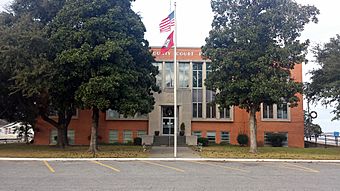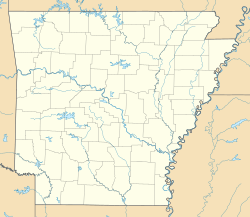Chicot County Courthouse facts for kids
|
Chicot County Courthouse
|
|
|
U.S. Historic district
Contributing property |
|
 |
|
| Location | 108 Main Street Lake Village, Arkansas |
|---|---|
| Area | less than one acre |
| Built | 1956 |
| Architect | Herbert Voelker and J.L. Dixon |
| Architectural style | Art Deco |
| Part of | Lake Village Commercial Historic District (ID11000025) |
| NRHP reference No. | 05001592 |
Quick facts for kids Significant dates |
|
| Added to NRHP | February 1, 2006 |
| Designated CP | February 18, 2011 |
The Chicot County Courthouse is a special building in Lake Village, Arkansas. It's where the main government offices for Chicot County are located. This building was finished in 1956. It sits at the end of the Lake Village Commercial Historic District, right by Lake Chicot. The courthouse is important because of its unique design and its history in the county. Because of its special style and history, it was added to the National Register of Historic Places in 2006.
A Look Back: The Courthouse's History
Chicot County was created on October 25, 1823. The first county government was in a place called Villemont. But Villemont was on the Mississippi River. Over time, the river washed parts of the town away.
So, in 1838, the county government moved to Columbia. This town also faced problems. In 1855, the county moved again, this time to Masona. Finally, in 1857, the county seat moved one last time to Lake Village. That same year, a courthouse and jail were built there.
The first Lake Village courthouse lasted for 50 years. In 1907, a new courthouse was built. It had a neoclassical style. But this building had problems with its foundation. So, in 1956, the current Chicot County Courthouse was built. Herbert Voelker and J.L. Dixon were the architects who designed it. Voelker was very good at designing public buildings. He had already designed eleven courthouses in Texas. His style was often Art Deco or Art Moderne.
Why This Building Matters to the Community
The new courthouse was built during a tough time for the Arkansas Delta. Many farmers were starting to use machines. This meant fewer jobs for people who worked in the fields. So, many people moved to bigger cities. As the population went down, businesses and services also left the area.
In 1957, Jack Rhodes became mayor. He worked hard to help the city. He started projects to improve roads and build new buildings.
One of the biggest improvements was fixing Lake Chicot. The lake had become very dirty from silt (mud and sand) coming from upstream. The lake's condition was embarrassing for the city. They even had to cancel the 1957 Chicot Water Carnival.
To solve the pollution problem, a big meeting happened in the Chicot County Courthouse in 1968. This meeting was about the "Lake Chicot Project." People from the Arkansas Game and Fish Commission (AGFC) and the United States Army Corps of Engineers (USACE) were there. They worked with the Chicot County Rural Development Authority.
Their plan helped the lake a lot. They built a dam and two pumping plants. They also controlled sediment and added fish to the lake. These actions made the lake beautiful and fun again.
The Chicot County Courthouse played a very important role in these changes. The county government helped start these projects. Because of this, the courthouse is a symbol of how the area improved after a difficult time in the 1960s.
 | Ernest Everett Just |
 | Mary Jackson |
 | Emmett Chappelle |
 | Marie Maynard Daly |



